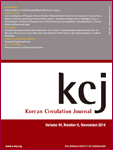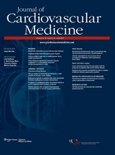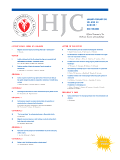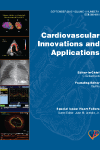
Korean Circulation Journal
Scope & Guideline
Exploring the Frontiers of Cardiac Research and Innovation.
Introduction
Aims and Scopes
- Cardiovascular Disease Management:
The journal emphasizes research related to the management of various cardiovascular diseases, including coronary artery disease, heart failure, and arrhythmias. This includes studies on treatment protocols, new therapeutic approaches, and clinical outcomes. - Innovative Interventional Techniques:
A significant focus is on interventional cardiology, highlighting advancements in techniques such as catheter ablation, transcatheter valve therapies, and the use of drug-coated balloons, among others. - Epidemiological and Public Health Studies:
The journal publishes studies that explore the epidemiology of cardiovascular diseases, risk factors, and population health, aiming to inform public health strategies and preventive measures. - Emerging Technologies and Biomarkers:
Research on the application of novel technologies, including artificial intelligence in diagnostics, imaging techniques, and the identification of biomarkers for cardiovascular disease is a core area of interest. - Genetic and Molecular Research:
The journal includes studies on the genetic and molecular aspects of cardiovascular diseases, exploring how genetic factors influence disease risk and treatment responses. - Patient-Centered Care and Quality of Life:
There is a focus on research that assesses patient-reported outcomes, quality of life, and the psychosocial aspects of living with cardiovascular conditions.
Trending and Emerging
- Artificial Intelligence and Machine Learning Applications:
Recent publications highlight the integration of artificial intelligence and machine learning in cardiovascular diagnostics and treatment strategies, reflecting a trend towards utilizing technology to enhance clinical decision-making. - Interventional Innovations:
There is a growing emphasis on innovative interventional techniques, including advanced catheter-based procedures and minimally invasive surgeries, which are becoming central to the journal's focus. - Cardio-Oncology:
The intersection of cardiology and oncology is increasingly featured, addressing the cardiovascular implications of cancer therapies and the management of patients with concurrent cardiovascular and cancer conditions. - Personalized Medicine and Genetic Insights:
Emerging research on personalized medicine, particularly the role of genetics in cardiovascular treatment, is gaining traction. This includes studies on pharmacogenomics and tailored treatment strategies. - Health Disparities and Population Health:
The journal is beginning to publish more on health disparities related to cardiovascular disease, emphasizing the need to address inequities in care and outcomes among different populations.
Declining or Waning
- Basic Science Research:
There seems to be a waning emphasis on purely basic science research related to cardiovascular biology. Although foundational studies are important, the journal's recent publications focus more on clinical applications and translational research. - Traditional Risk Factor Studies:
Research focusing on traditional risk factors for cardiovascular diseases, such as hypertension and hyperlipidemia, is less prevalent. The journal appears to be shifting towards more innovative and integrative approaches to risk assessment. - Non-Invasive Monitoring Techniques:
There has been a noticeable decrease in studies centered on traditional non-invasive monitoring techniques, as newer technologies and methodologies gain traction in cardiovascular diagnostics. - Longitudinal Studies on Established Treatments:
Long-term studies assessing the efficacy of established cardiovascular treatments have decreased, possibly due to the shift towards exploring novel therapeutic strategies and personalized medicine.
Similar Journals

Journal of Cardiovascular Development and Disease
Exploring the frontiers of cardiac development and disease.Journal of Cardiovascular Development and Disease, an esteemed publication by MDPI, has been a dedicated platform for disseminating cutting-edge research since its inception in 2014. Based in Switzerland, this Open Access journal not only provides unrestricted access to its content but also fosters global collaboration among scholars focusing on cardiovascular health and disease development. With an impressive focus classified as Q1 in Pharmacology, Toxicology and Pharmaceutics for 2023, it attracts a diverse range of interdisciplinary research, supporting advancements in pharmacological applications relevant to cardiac conditions. The journal's ongoing convergence through 2024 highlights its commitment to the evolving landscape of cardiovascular research, making it a vital resource for researchers, professionals, and students alike who are keen to contribute to and learn from significant developments in this critical field.

Heart International
Connecting researchers and clinicians in the pursuit of heart health.Heart International is a prominent open-access journal dedicated to the fields of cardiology and cardiovascular medicine, published by TOUCH MEDICAL MEDIA LTD since 2006. Based in Italy, this journal serves as a vital platform for researchers, clinicians, and students, aiming to disseminate cutting-edge scientific findings and clinical insights that advance the understanding of heart health. With an ISSN of 2036-2579 and an emphasis on accessible content, Heart International ensures that valuable research is available to a wide audience, thereby contributing to the global discourse on cardiovascular issues. Although it currently holds a Q4 quartile ranking in its category and is positioned in the lower percentile for Scopus rankings, the journal is committed to improving its impact through rigorous peer review and high-quality publications. The journal covers a wide array of topics within the cardiology domain, making it an essential resource for those looking to stay abreast of the latest developments in heart research.

Journal of Cardiovascular Medicine
Elevating Standards in Cardiovascular MedicineWelcome to the Journal of Cardiovascular Medicine, a leading platform for the dissemination of high-quality research in the field of cardiology and cardiovascular medicine. Published by Lippincott Williams & Wilkins, this esteemed journal boasts an ISSN of 1558-2027 and an E-ISSN of 1558-2035, reflecting its commitment to accessible and innovative cardiovascular research. With a significant impact factor and ranked Q2 in both Cardiology and Cardiovascular Medicine as well as in Medicine (Miscellaneous) for 2023, the journal is recognized for its contributions to advancing knowledge and practice in this critical area of health. The journal disseminates original research, reviews, and clinical studies, aimed at clinicians, researchers, and healthcare professionals who are dedicated to improving cardiovascular health outcomes. With a continuous commitment to evolving research from 2006 to 2024, the journal is an essential resource for those looking to stay at the forefront of the latest discoveries and methodologies in cardiovascular medicine.

Cardiology Journal
Unleashing insights for better heart health.Cardiology Journal, published by VIA MEDICA, stands as a prominent resource in the field of cardiology and cardiovascular medicine, with an ISSN of 1897-5593 and an E-ISSN of 1898-018X. Recognized for its Open Access model established since 1994, this journal facilitates widespread dissemination of critical research findings, allowing practitioners and researchers globally to access valuable insights without barriers. Based in Poland, with an address at UL SWIETOKRZYSKA 73, 80-180 GDANSK, it has achieved a respectable Q2 classification in 2023 for both Cardiology and Miscellaneous Medicine categories, reflecting its influence and quality within the scholarly community. With a Scopus ranking placing it at #117 out of 387 in Cardiology, it lies within the 69th percentile, underpinning its commitment to advancing knowledge in cardiovascular health. The journal’s converged years extending from 2006 to 2024 ensure it captures ongoing developments in a rapidly evolving field. As such, the Cardiology Journal serves as an indispensable platform for researchers, professionals, and students dedicated to exploring the frontiers of cardiac science and improving patient care.

Revista de la Federacion Argentina de Cardiologia
Shaping the future of cardiovascular medicine with every publication.Revista de la Federacion Argentina de Cardiologia is a vital publication in the field of Cardiology and Cardiovascular Medicine, providing a platform for researchers and healthcare professionals to share significant findings and innovative concepts since its inception in 2012. Published by the Federacion Argentina Cardiology, this journal specifically addresses contemporary issues and advancements within cardiology, contributing to the scholarly dialogue essential for improving cardiovascular health. Despite being categorized in the Q4 quartile for 2023 and presently ranking #358 out of 387 in its field, the journal remains committed to fostering academic inquiry and disseminating valuable research for both local and global audiences. Although it is not an open-access journal, it strives to balance accessibility with rigorous academic standards, ensuring quality contributions that are critical for practitioners and students alike. The journal’s ongoing evaluation and adaptation in the ever-evolving landscape of cardiology underscore its importance in advancing cardiovascular science and practice.

Minerva Cardiology and Angiology
Transforming cardiovascular practices with cutting-edge findings.Minerva Cardiology and Angiology, published by EDIZIONI MINERVA MEDICA, is a prominent journal in the field of cardiology and cardiovascular medicine, with an ISSN of 2724-5683 and E-ISSN of 2724-5772. Established in 2021, this journal aims to foster the dissemination of cutting-edge research, clinical practice guidelines, and innovative methodologies relevant to cardiovascular health. As of 2023, it holds a commendable Q3 quartile rank in its category, reflecting its growing influence within the scientific community. The journal is indexed in Scopus, where it ranks #221 out of 387 in its field, placing it in the 43rd percentile overall. Although it currently does not offer Open Access options, articles published in Minerva Cardiology and Angiology contribute significantly to ongoing discussions and advancements in heart and vascular health. The journal serves as an invaluable resource for researchers, healthcare professionals, and students seeking to stay informed on the latest developments in cardiology.

Hellenic Journal of Cardiology
Connecting Researchers and Clinicians for a Stronger Heart FutureThe Hellenic Journal of Cardiology, a peer-reviewed open-access publication under the esteemed ELSEVIER banner, proudly represents the forefront of research in the field of Cardiology and Cardiovascular Medicine. Established in 1993 and actively publishing since then, this journal has carved a niche in disseminating high-quality research and clinical insights relevant to cardiovascular health in Greece and beyond. With an impressive Q2 ranking in both Cardiology and Cardiovascular Medicine categories as of 2023, the journal holds a commendable position at Rank #126/387 in Scopus, indicative of its critical role in advancing scientific knowledge and practice. The Hellenic Journal of Cardiology transitioned to open access in 2016, ensuring that ground-breaking research is freely accessible, fostering a global dialogue among researchers, clinicians, and students alike. Its publication frequency spans significant years, providing a continuous flow of innovative findings while addressing pressing cardiovascular issues. As the journal builds on its legacy, it aspires to enrich the academic community's understanding of cardiovascular medicine, making it an invaluable resource for anyone invested in heart health.

Pakistan Heart Journal
Innovating Heart Health Research for a Brighter Tomorrow.Pakistan Heart Journal, with the ISSN 0048-2706 and E-ISSN 2227-9199, is a premier publication by the Pakistan Cardiac Society, dedicated to advancing the field of cardiology and cardiovascular medicine. Established as an Open Access journal since 2011, it provides a valuable platform for researchers and clinicians to disseminate innovative findings and insights within this critical area of health. Based in Karachi, Pakistan, at the National Institute of Cardiovascular Diseases, this journal aims to foster an enriched understanding of cardiovascular health by publishing rigorous research, case studies, and review articles. Despite its current categorization as Q4 in the latest 2023 quartiles and a rank of 357/387 in the Scopus database, it plays a vital role in the academic community, encouraging collaborative efforts and dialogue among professionals. The journal aspires to converge diverse perspectives and innovations in cardiology from 2019 to 2024, thereby enhancing the quality and scope of cardiovascular research in the region and beyond.

World Journal of Cardiology
Fostering collaboration and discovery in cardiovascular research.World Journal of Cardiology, published by BAISHIDENG PUBLISHING GROUP INC, stands out as a pivotal resource in the field of cardiology and cardiovascular medicine. With an ISSN of 1949-8462, this journal serves a global audience, promoting knowledge dissemination and collaboration among researchers, healthcare professionals, and students dedicated to advancing cardiovascular health. The journal demonstrates its credibility and impact in the field by achieving a respectable Q2 ranking in the 2023 category of Cardiology and Cardiovascular Medicine. Notably, it is listed in the Scopus database, ranking #189 out of 387 journals, placing it in the 51st percentile, which underscores its relevance and contribution to contemporary cardiovascular research. Although it operates under a subscription model, the journal provides diverse access options, ensuring that critical findings reach a wide audience. Through its comprehensive scope and commitment to publishing high-quality articles, the World Journal of Cardiology plays a vital role in shaping the future of cardiovascular science, making it an invaluable asset for those involved in this essential discipline.

Cardiovascular Innovations and Applications
Championing open access to revolutionary cardiovascular research.Cardiovascular Innovations and Applications is a premier open-access journal dedicated to advancing knowledge in the field of cardiovascular medicine. Published by COMPUSCRIPT since 2016, this journal provides a platform for the dissemination of innovative research and applications that address crucial topics in cardiology, aiming to bridge the gap between clinical practice and cutting-edge research. With an ISSN of 2009-8618 and an E-ISSN of 2009-8782, it operates on a global scale, facilitating access to high-quality content without financial barriers. The journal is positioned within the Medicine - Cardiology and Cardiovascular Medicine category, and its current Scopus rank of #321/387 reflects its potential for growth and influence in the academic community, being in the 17th percentile. Researchers, healthcare professionals, and students will find Cardiovascular Innovations and Applications an invaluable resource in their quest for the latest findings and advancements in cardiovascular health and treatment methodologies.